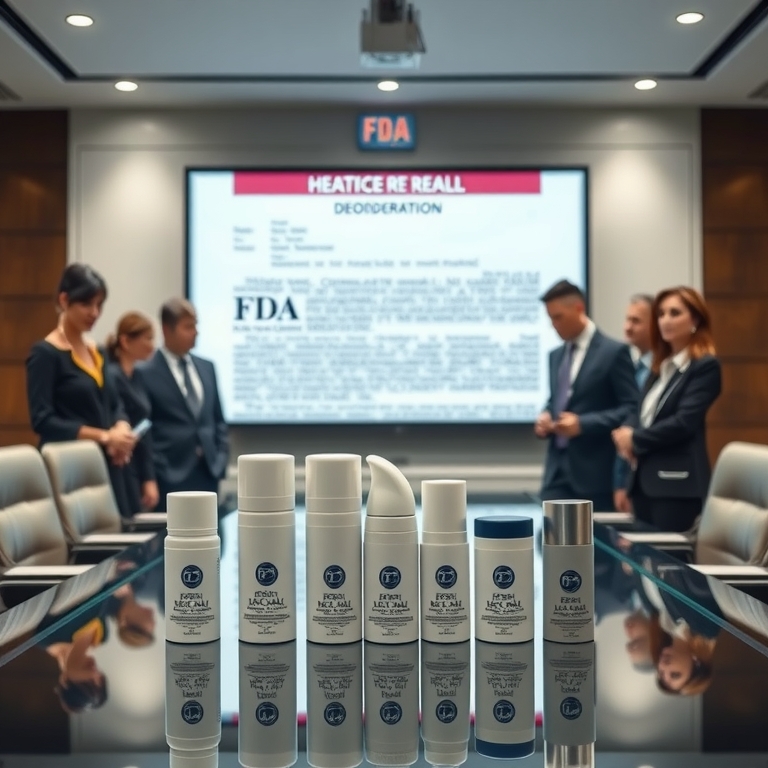In an unexpected turn of events, the U.S. Food and Drug Administration (FDA) has issued a significant recall of several popular deodorant brands, citing the presence of harmful contaminants that pose potential health risks to consumers. This news has sent ripples through both the personal care industry and the millions of consumers who rely on these products daily. As the FDA takes decisive action, it is imperative for consumers to respond promptly to protect their health and well-being.
The recall, announced late last week, specifically targets a range of aerosol deodorants that, upon rigorous testing, were found to contain elevated levels of benzene, a known carcinogen. Benzene is a volatile compound that, although naturally occurring in the environment, can have severe health implications when humans are exposed to it at high levels over extended periods. Long-term exposure to benzene is linked to blood disorders, including leukemia and other blood cancers, making this recall a matter of urgent concern.
The brands under scrutiny are household names, trusted by consumers for their purported safety and effectiveness. This development has understandably shaken consumer confidence, as it raises questions about the safety protocols and quality control measures employed by manufacturers in the personal care sector. The FDA’s swift action underscores the importance of regulatory oversight in maintaining public safety and ensuring that consumer products adhere to stringent safety standards.
For consumers, the first step is to identify whether any products in their possession are part of the recall. The FDA has provided detailed information, including specific lot numbers and expiration dates, to help consumers ascertain if their deodorants are affected. It is crucial for consumers to cross-reference this information with their current deodorant supplies. Products identified as part of the recall should be discontinued immediately to mitigate any potential health risks.
In addition to ceasing use of the recalled products, consumers are advised to safely dispose of these items. The FDA recommends following local guidelines for hazardous waste disposal to ensure that these potentially harmful substances do not pose a further risk to the environment. Consumers are also encouraged to contact the manufacturers for instructions on obtaining a refund or replacement, as companies are expected to address this issue by compensating consumers for the inconvenience and potential risk.
This recall serves as a reminder of the critical role that regulatory bodies like the FDA play in safeguarding public health. The agency’s ability to detect and respond to such issues is vital in maintaining trust in consumer products. It also underscores the importance of ongoing vigilance and rigorous testing by manufacturers to prevent contaminants from entering the supply chain.
For the companies involved, this incident represents a significant challenge, both in terms of financial impact and reputational damage. The cost of recalling products, coupled with potential legal liabilities, could be substantial. However, the greater challenge lies in regaining consumer trust. Companies will need to demonstrate transparency and accountability in their response to the recall, ensuring that they take comprehensive measures to prevent similar issues in the future.
The recall also highlights broader industry challenges, particularly regarding the sourcing and testing of raw materials. In an increasingly globalized supply chain, ensuring the purity and safety of ingredients can be complex. This incident may prompt other companies in the personal care industry to reevaluate their own supply chains and quality control processes, possibly leading to industry-wide improvements in safety standards.
For consumers, this situation is a poignant reminder of the importance of being informed and proactive about the products they use. Staying updated on recalls and safety advisories, reading product labels carefully, and understanding ingredient lists are all vital steps in making informed choices. Additionally, consumers might consider consulting resources such as the Environmental Working Group’s Skin Deep database or similar platforms that provide information on product safety and ingredients.
As the situation unfolds, the FDA and the manufacturers involved are expected to provide ongoing updates and guidance. Consumers should remain vigilant, keeping abreast of any new information that may emerge. In the meantime, the focus should be on ensuring personal safety by adhering to the recall guidelines and taking swift action where necessary.
In conclusion, the FDA’s recall of these deodorant brands over harmful contaminants serves as a significant reminder of the critical importance of product safety and regulatory oversight. While the immediate priority is ensuring consumer safety, this incident also provides a valuable opportunity for reflection and improvement within the industry. By addressing the root causes of such issues and implementing robust preventive measures, manufacturers can begin to rebuild trust and ensure that consumer safety remains paramount. As this situation evolves, it is essential for all stakeholders—consumers, manufacturers, and regulators alike—to remain engaged and proactive in addressing the challenges and ensuring the integrity of the products we rely on daily.

Leave a Reply